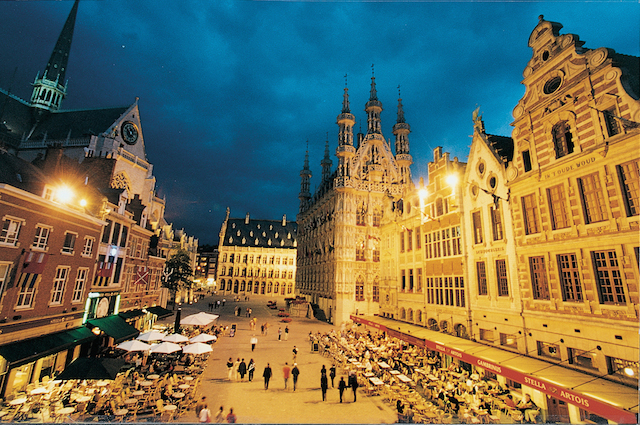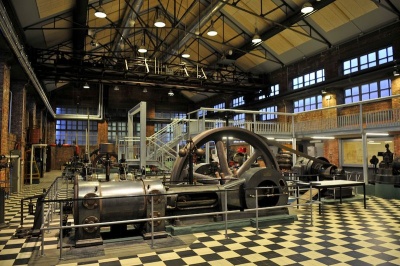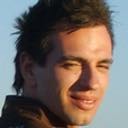IFL 2016
The 28th symposium on Implementation and Application of Functional Languages
August 31 - September 2, 2016, KU Leuven, Belgium

Grote Markt, Leuven, Belgium
Welcome
Welcome to the website for IFL 2016, the 28th Symposium on Implementation and Application of Functional Languages. The goal of the IFL symposia is to bring together researchers actively engaged in the implementation and application of functional and function-based programming languages. IFL 2016 will be a venue for researchers to present and discuss new ideas and concepts, work in progress, and publication-ripe results related to the implementation and application of functional languages and function-based programming.
News
- The finalized program is now available below. See you tomorrow at IFL 2016!
- IFL 2016 features 34 accepted presentations. This means a full program from Wednesday morning to Friday evening. The preliminary program is coming soon.
Venue
The 28th IFL is organized by the Programming Languages Group of KU Leuven, Belgium. The event will be held in the Auditorium of the 2nd Law of Thermodynamics and the adjacent Machine Room of the thermotechnical institute on Campus Heverlee.
The symposium map marks all important locations.
Getting To Leuven
Leuven is directly connected to Brussels Airport by bus or train. The journey itself takes 13 minutes by train (fare including Diabolo airport tunnel fee: 8.90 EUR), and up to an hour by bus (line 651,652 towards Zaventem-Leuven).
If you arrive through Brussels-South (Charleroi) airport, we suggest you take the Brussels City Shuttle (cheaper to book online, with return fare, but tickets can be bought on the bus also) to the Brussels-Midi train station where you can board a train to Leuven.
If you arrive by high-speed train in the Brussels-Midi or Liège-Guillemins train station, you can board a regular train to Leuven.

The Machine Room, Thermotechnical Institute
Getting To The Venue
The venue itself, although located outside the city proper, is easily accessible by the public transportation bus service from Leuven's train station, for example with line 2 towards Heverlee (closest stop: "Heverlee Kasteel Arenberg", the journey may take up to 35 minutes, depending on traffic).
You can also walk to the venue (30 minutes from the center of town, 40 minutes from the station) or cycle (blue bike point, rent a bike near the station).
Additionally, the venue can be reached directly from the airport (and vice versa) by bus line 616. Note that this route may take over an hour.
More Information
For more information, please consult the website of DeLijn, the Flemish public transportation company; belgianrail for train routes or consult Google Maps.
Accommodation
We provide a list of hotel suggestions that are within easy reach of the venue, either by bus or on foot. There are no special IFL 2016 rates. Favorable rates and booking can be done directly with the hotel or through any online hotel brokering service.
You can add your name to let the other participants know where you are staying.
Scope of the Symposium
The goal of the IFL symposia is to bring together researchers actively engaged in the implementation and application of functional and function-based programming languages. IFL 2016 is a venue for researchers to present and discuss new ideas and concepts, work in progress, and publication-ripe results related to the implementation and application of functional languages and function-based programming.Symposium Program
The symposium runs from Wednesday morning until Friday afternoon. Wednesday and Friday morning will feature keynotes. Thursday afternoon and evening are reserved for the social excursion and the symposium banquet. The regular talks' slots are 25 minutes long.
Here is the list of accepted papers.
Wednesday, August 31
| Start | End | |
|---|---|---|
Registration |
8:00 | 8:50 |
Intro |
8:50 | 9:00 |
KeynoteCoen De Roover. Functional Programming in an Impure World: A Tool Builder's PerspectiveChair: Christophe Scholliers |
9:00 | 10:00 |
Morning Session 1Chair: Christophe Scholliers
|
10:00 | 10:25 |
Coffee Break |
10:25 | 10:50 |
Morning Session 2Chair: Jurriaan Hage
|
10:50 | 12:05 |
Lunch Break |
12:05 | 13:30 |
Afternoon Session 1Chair: Sven-Bodo Scholz
|
13:30 | 14:45 |
Coffee Break |
14:45 | 15:10 |
Afternoon Session 2Chair: Marco T. Morazan
|
15:10 | 16:25 |
Short Break |
16:25 | 16:40 |
Afternoon Session 3Chair: Nicolas Wu
|
16:40 | 17:55 |
Thursday, September 1
| Start | End | |
|---|---|---|
Morning Session 3Chair: Coen De Roover
|
9:00 | 10:15 |
Coffee Break |
10:15 | 10:40 |
Morning Session 4Chair: Jan Martin Jansen
|
10:40 | 11:55 |
Lunch Break |
11:55 | 13:00 |
Afternoon Session 4Chair: Maciej Piróg
|
13:00 | 14:15 |
Coffee Break |
14:15 | 14:40 |
Afternoon Session 5Chair: Pieter Koopman
|
14:40 | 15:55 |
ExcursionYour choice of:
|
16:30 | 19:00 |
Symposium Banquet at the Faculty Club |
19:30 |
Friday, September 2
| Start | End | |
|---|---|---|
KeynoteNicolas Wu. The Implementation and Application of Effect HandlersChair: Tom Schrijvers |
9:00 | 10:00 |
Morning Session 5Chair: Tom Schrijvers
|
10:00 | 10:25 |
Coffee Break |
10:25 | 10:50 |
Morning Session 6Chair: Pierre Jouvelot
|
10:50 | 12:05 |
Lunch Break |
12:05 | 13:30 |
Afternoon Session 6Chair: Rinus Plasmeijer
|
13:30 | 14:30 |
Coffee Break |
14:30 | 14:55 |
Afternoon Session 7Chair: Venanzio Capretta
|
14:55 | 16:10 |
Important Dates
| Notification of acceptance for post-symposium proceedings: | January 31, 2017 |
| Camera-ready version for post-symposium proceedings: | March 15, 2017 |
Submission Details
Prospective authors are encouraged to submit papers or extended abstracts to be published in the draft proceedings and to present them at the symposium. All contributions must be written in English. Papers must adhere to the standard ACM SIGPLAN two columns conference format, which can be found at http://www.sigplan.org/Resources/Author/. For the pre-symposium proceedings we adopt a 'weak' page limit of 12 pages. For the post-symposium proceedings the page limit of 12 pages is firm.
Submit through EasyChair
Clarification of IFL's Unique Submission Process
The submission process of IFL may be unfamiliar to authors who are used to conferences and symposia that feature peer-reviewed proceedings that are formally published and distributed at the event. IFL does not work that way.
The idea of IFL is to present work in progress at the symposium and to gather feedback from the other participants. After the symposium the feedback can be incorporated into a full research paper which is submitted to the peer-reviewed post-symposium proceedings that are formally published.
Hence, there are three stages of submission:
- The draft paper (by August 1) is used to assess whether the work to be presented is relevant for IFL.
- The pre-symposium paper (by August 22) is shared with the other participants at the symposium. It does not constitute a formal publication. By default the draft paper is used, but authors have to opportunity to update and extend it after the August 1 deadline.
- The post-symposium paper (by December 1) is a full research paper for peer review and publication in the formal post-proceedings. Only works presented at IFL 2016 can be submitted to the IFL 2016 post-proceedings. However, it is not compulsory to submit to the post-proceedings.
Registration Details
We offer different fees depending on early/late registration and student status:
| Student | Regular | |
|---|---|---|
| Early Bird | 225 Euros | 300 Euros |
| Late Bird | 275 Euros | 350 Euros |
Registration includes participation in the symposium, lunches, coffee breaks, the excursion and the symposium banquet on Thursday.
Registration is now closed. Click for payment information.Keynote Speakers
Coen De Roover, University of Brussels
Functional Programming in an Impure World: a Tool Builder's Perspective
Functional programming is a popular choice for building program analysis and transformation tools. Developers, however, expect the resulting tools to integrate with their development environments. Functional tool builders therefore sooner or later face the challenge of integrating with this largely impure world. In the first part of this talk, I will share practical insights gained from developing Eclipse plugins in Clojure. On the one hand, purity has brought several benefits to the implementation of our program transformation plugin. It was, among others, a breeze to parallelize the evolutionary algorithm that recommends edits to a transformation specification. On the other hand, several attempts were needed before the plugins integrated properly with Eclipse. In the second part of the talk, I will address what tool builders can do to improve the situation. A purity analysis for higher-order imperative languages will be presented. Built according to the abstracting abstract machines methodology, this analysis determines the purity of functions based on the side effects they generate or depend upon. As such, it is a first step towards tool support for a symbiosis between pure and impure implementations.
Nicolas Wu, University of Bristol
The Implementation and Application of Effect Handlers
Effect handlers are a way of working with algebraic effects, and an alternative to monad transformers. In this talk, we'll be looking one way to implement them in Haskell, and we'll work through some of their practical applications. Effect handlers offer an approach that is inherently modular when dealing with effects, but there are some practical caveats, which we will explore.
Program Committee
| Sandrine Blazy | University of Rennes 1 | |
| Laura Castro | University of A Coruña | |
| Jacques Garrigue | Nagoya University | |
| Clemens Grelck | University of Amsterdam | |
| Zoltan Horvath | Eötvös Loránd University | |
| Jan Martin Jansen | Netherlands Defence Academy | |
| Mauro Jaskelioff | CIFASIS/Universidad Nacional de Rosario | |
| Patricia Johann | Appalachian State University | |
| Wolfram Kahl | McMaster University | |
| Pieter Koopman | Radboud University Nijmegen | |
| Shin-Cheng Mu | Academia Sinica | |
| Henrik Nilsson | University of Nottingham | |
| Nikolaos Papaspyrou | National Technical University of Athens | |
| Atze van der Ploeg | Chalmers University of Technology | |
| Matija Pretnar | University of Ljubljana | |
| Tillmann Rendel | University of Tübingen | |
| Christophe Scholliers | Universiteit Gent | |
| Sven-Bodo Scholz | Heriot-Watt University | |
| Melinda Toth | Eötvös Loránd University | |
| Tom Schrijvers | KU Leuven | |
| Meng Wang | University of Kent | |
| Jeremy Yallop | University of Cambridge |
Steering Committee
The list of Steering Committee membersOrganizing Committee
- Chair:
- Tom Schrijvers
- Website:
- Alexander Vandenbroucke
- Various:
- Maciej Piróg
- Steven Keuchel
- Amr Saleh
- Klara Marntirosian
- George Karachalias





